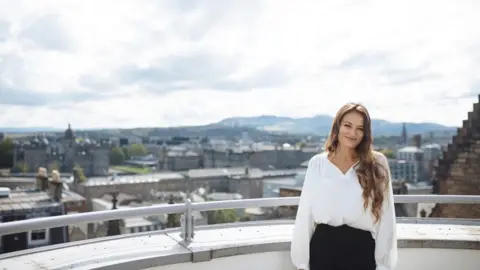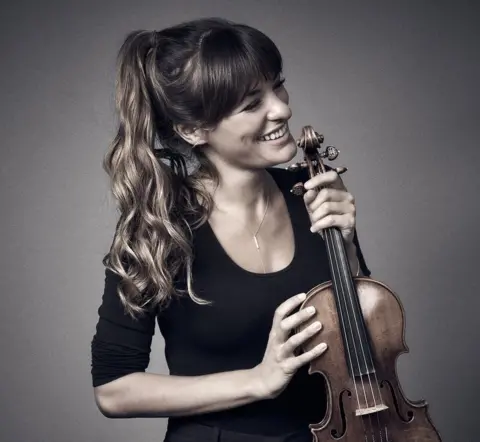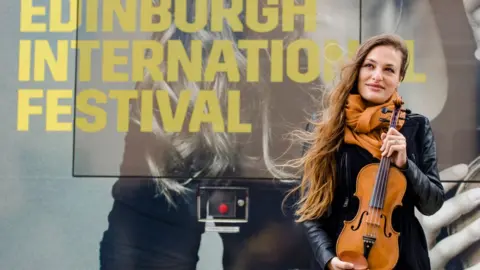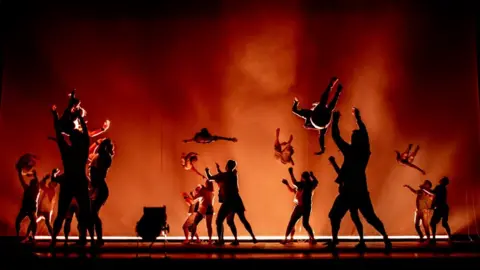Nicola Benedetti: 'We need creativity more than ever'
 Jassy Earl
Jassy EarlJust a day before Nicola Benedetti gives her first interviews as director of the Edinburgh International Festival, there's a slew of gloomy news from the Scottish cultural sector.
The National Galleries of Scotland warn they'll "struggle to keep their doors open". The CEO of Creative Scotland tells the culture committee that many organisations are "fighting for survival" and before the morning is out, the charity which runs the Edinburgh International Film Festival has called in the administrators.
It's a challenging time for anyone involved in the arts, but Nicola Benedetti has arrived in her post, as director of the Edinburgh International Festival, fighting.
"I'm acutely aware of the vulnerability of our position and it's heart breaking news about the film festival," she says.
"On the other hand, it's a time when boldness, creativity and imagination are more needed than ever. It's people who get us in and out of every wave and our ability to solve problems, literally imagine our way out.
"We need to speak to our arts and culture more boldly, own that space more fiercely, and that's speaking on behalf of the full cultural landscape of Scotland. It's something which is a huge responsibility, but we have to rise to the challenge."
Her appointment to the post came as something of a surprise, not just to the cultural sector but to the award-winning violinist herself.
"I remember getting this phone call and thinking I was being asked to recommend someone for the job, and it took me a while to realise they were asking me."
 Andy Gotts
Andy GottsShe began to consider what she could bring to the job. Since winning BBC Young Musician of the Year at the age of 16, she has been performing internationally, released 12 albums, won a Grammy award and set up her own foundation to promote music education. And while she had no formal training in arts administration, she realised she had been absorbing it for more than 20 years.
"Very quickly, ideas that were born when I was 16, some when I was 20, some born in Japan, some in Scotland, came to mind," she says.
"Whenever I had spoken to audiences, those who run orchestras, or theatres or concert halls, I had been asking questions. It was twenty years of touring the world, asking those questions."
She also acknowledges her parents, Scots Italians, Giovanni and Francesca. Her father is a retired businessman and entrepreneur.
"Having come from a business background with a highly optimistic, sometimes unrealistic, father and a very realistic, sometimes pessimist mother, I'm always looking at what can be done differently or better."
 Getty Images
Getty ImagesShe convinced the board at the Edinburgh International Festival, and in March this year, she was announced as the first woman, and the first Scot, to take up the post. She officially took over from Fergus Linehan (who'd held the post since 2015) at the start of October, but she says work began almost immediately on programmes which can often involve bookings years in advance.
She likens her role in the organisation, to that of a performer with an orchestra. It's a team effort, involving many different people.
"One of the biggest challenges for an orchestra to sound great and do justice to the music, is for everyone to understand their strongest function and if you can that, you will perform best. "
"It's a wonderful way to look at it and for me bringing the public with us on this journey is important, regardless of where you're from or what your experience is."
She's immersed herself in the history of the 75-year event, and of course she's played her own part in the most recent stage, including the 2021 pandemic festival which involved scaled down, outdoor concerts. She says it made her realise the resilience of the festival, and the support it had.
"I just recall looking out into that enormous tent and being overwhelmed with emotion. It was telling to me that I didn't understand how common that emotion was until I started speaking to audiences this year and realised, we all experienced that emotion. That shared emotion is what people do feel, what people want to feel and what we want to feel more of."
Her high profile should help both with audiences, and with funding partners.
"We'll see. I know a lot of people in Scotland. I'm from here. I can speak directly to people. I understand the historic and humble position the festival occupies."
"It's also not a stretch to me to understand why someone wouldn't feel welcome or understand the arts."
"I would feel closer to the average person walking into a concert hall, feeling there are things they don't know."
 Darcy Grant
Darcy GrantHer youth - she's 35 - may also help the festival attract younger audiences.
"There's an absolute common desire to ask where our future audiences are coming from but it's a total misconception that anywhere at the festival is a closed door. I hope we can make that clear in transparent messaging. I don't need to go through a process of translation, I can speak directly to young people and the festival is committed to that."
She says she would rather prepare new audiences for the traditional elements of a classical performance, than see them changed.
"It's important to maintain the traditional elements of concerts - the hall, the quiet, the attention."
"There's ways of doing that which is neither patronising a new audience nor diminishing the experience for the existing audience."
"All the experiences I've had from the stage and from producing events, every minutiae from programmes, to lighting, to tickets, I've had that experience from a number of different angles and I I've also seen what's way over the top and destroys the intimacy and beauty."
"That collective listening experience is a wonderful thing and something you don't get a lot of, out there in the chaos of the world so it's a careful balancing act to protect it, and make sure it's open to everyone."
Balance seems like the perfect word for a violinist, adding a new string to her bow. But how much of the musician will we hear at future festivals?
"It's something we will consider year by year but I'm going to be playing," she says.
"I feel it would be mean and not wise to say I'm taking over this role but you're never going to hear me play."
"I will definitely be playing. It's just a case of what and when."
